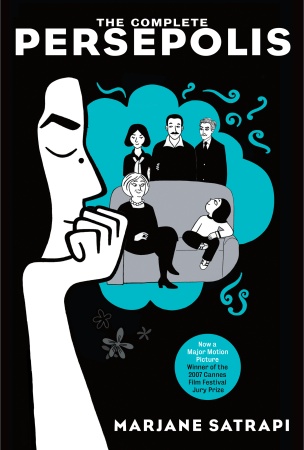What I've been reading

The Complete Persepolis, by Marjane Satrapi
The autobiography of a Western-leaning Muslim girl and her coming-of-age in revolutionary Iran, rendered all the more gripping by its graphic novel format.

The Faith Club: A Muslim, A Christian, A Jew -- Three Women Search for Understanding, by Ranya Idliby, Suzanne Oliver, and Priscilla Warner
Through a free, responsible, and often tension-laden search, three women of different faiths discover the common truths beyond the illusory differences of their religious traditions. As a UU, it was good to be reminded that something we UUs take for granted can be so difficult for others to discover.

Nature Girl, by Carl Hiaasen
If Dave Barry wrote suspense novels, he would be Carl Hiaasen. Death, mayhem, telemarketing, and earth-centered values plague an unlikely collection of zany characters in the Everglades.

The Devil in the White City, by Erik Larson
As Daniel Burnham and an all-star team of America's best Beaux Arts architects, landscape architects, and urban planners race to complete construction in time for the opening of the massive 1893 Chicago World's Fair, a demon-possessed serial murderer is also building a nearby tourist hotel, fitted out to serve double duty as a house of torture and death. It may sound too weird and fantastic to make a credible story -- except that it's all true.

5 Comments:
Have you seen the film of The Complete Persepolis? Fantastic.
LOVE Carl Hiaasen and have a theory he writes about all the crazy shit that comes across the Herald's news desk in the middle of the night and never quite makes it into the paper.
CC
The Devil in the White City TOTALLY freaked me out
"As a UU, it was good to be reminded that something we UUs take for granted can be so difficult for others to discover." This ignorant lurker is not exactly sure what you mean here. Would you please discuss this further?
Thanks
Dudley M. Jones
jonesdudley@hotmail.com
Dudley, we UUs have for a long time tended to see the religions of the world to represent different cultural apprehensions of the same larger reality, and we tend to take the most reliable truths to be those which are most widely apprehended across differing cultural and religious traditions. We tend to take an eclectic approach to religion, including our own Protestant Christian heritage, drawing truths from many disparate sources and and rejecting as unreliable that which cannot survive skeptical examination or be reconciled to more recently acquired knowledge. We have been doing this at least since the 1830's and '40's, when Ralph Waldo Emerson began exploring Hinduism and Theodore Parker preached "The Transient and Permanent in Christianity."
The Faith Club was written by three women -- a Muslim, and Christian, and a Jew -- who wanted to write a childrens' book about the common thread among their three faiths after 9/11 in order to fight hatred and prejudice, but found that some of the basic premises and prejudices of their own religious orientations had to be confronted and overcome first. It's a reminder for UUs that (1) some things that we easily believe because they seem obvious to us, and that we think ought to seem just as obvious to everyone else, are in fact very difficult and challenging for many others even when there is plenty of good will, and (2) some things that we pride ourselves for understanding, and that seem self-evidently true to us, actually may not be.
Post a Comment
<< Home